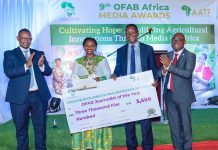By Milliam Murigi
African governments have been urged to increase investment in scientific research, or the continent will continue ‘punching below its weight’.
The call was made in Nairobi during the launch of the International Centre of Insect Physiology and Ecology’s (icipe) 2026–2030 strategic plan, which aims to guide the organization’s research and innovation priorities over the next five years.
Speaking during the event, renowned legal scholar Prof. Patrick Loch Otieno (PLO) Lumumba said that unless Africa takes full control of its scientific agenda, the continent will remain dependent on external donors and unable to realize its full potential.
“As long as African research institutions rely on external donors, Africa will not control her scientific destiny,” he said. “We must stop being politically correct about this reality.”
Prof.Lumumba lamented that most African countries allocate less than one percent of their GDP to research, the lowest proportion globally. This chronic underfunding, he said, leaves African scientists dependent on donor support often disguised under terms like “partners” and unable to set their own priorities.
The professor criticized the continent’s long record of high-level meetings and declarations—from the Lagos Plan of Action to resolutions in Maputo, Malabo, Abuja, and Nairobi arguing that conferences have become more common than tangible progress.
“We have no shortage of meetings, but we remain in the backwaters of science,” he said. “Even in food production, we still import what we should be producing.”
Prof.Lumumba warned that conflicts in regions continue to undermine scientific and technological progress. He challenged African leaders to match their rhetoric with action, saying science will only thrive when governments commit long-term, sustainable funding and supportive policies.
“Africa must not remain in scientific diapers forever. The renaissance of science will only come when universities stop being mere certificate-issuing factories and when research is adequately funded.”
Speaking at the same event, Dr.Tom Kariuki, Science for Africa Foundation CEO, said that while African scientists excel in discovery, the continent remains painfully weak in commercialization. Until Africa translates research into products, companies, and public benefits, scientific progress will remain trapped in academic journals.
“This gap between discovery and commercialization remains one of Africa’s biggest missed opportunities,” Dr. Kariuki said.
He called for Africa to redefine excellence using its own metrics, support early-career researchers and women, and deliberately channel funding to historically disadvantaged institutions. Currently, according to him only a handful of “usual suspects” receive nearly all research grants, leaving thousands of African universities and research centers starved of opportunity.
Most importantly, he insisted that science must be rooted in Africa’s priorities—climate, food, and health—and supported through long-term funding, strong oversight, and government co-financing.
“Africa must reclaim its scientific agenda by anchoring research in the continent’s own priorities rather than continuing to depend on externally defined agendas. Only then can Africa shift from discovery to commercialization,” Dr. Kariuki said.
He also challenged African governments and researchers to rethink where they seek funding. Too often, he said, the science community appeals to ministries of health or education, yet the real decisions about resourcing research sit in national treasuries, planning units, and economic offices.
Until African countries treat research and innovation as economic investments rather than social add-ons, the continent will continue to lag.
Dr. Korir Sing’Oei, Principal Secretary, State Department for Foreign Affairs, who was also present during the event, called for deeper collaboration to unlock the full potential of Africa’s bio-economy. He appealed for enhanced technical financing, stronger public-private investment, joint research programmes and increased youth participation in scientific entrepreneurship and innovation.
He emphasized that the country’s sustainable growth continues to depend on how boldly institutions, the government, and the private sector invest in knowledge-driven development.
“The Government of Kenya stands ready to deepen its partnership with icipe to nurture the next generation of African innovators and accelerate home-grown, science-led development. Kenya remains committed to strengthening collaboration with icipe to support its mandate both locally and across the continent,” said Dr. Sing’Oei.






